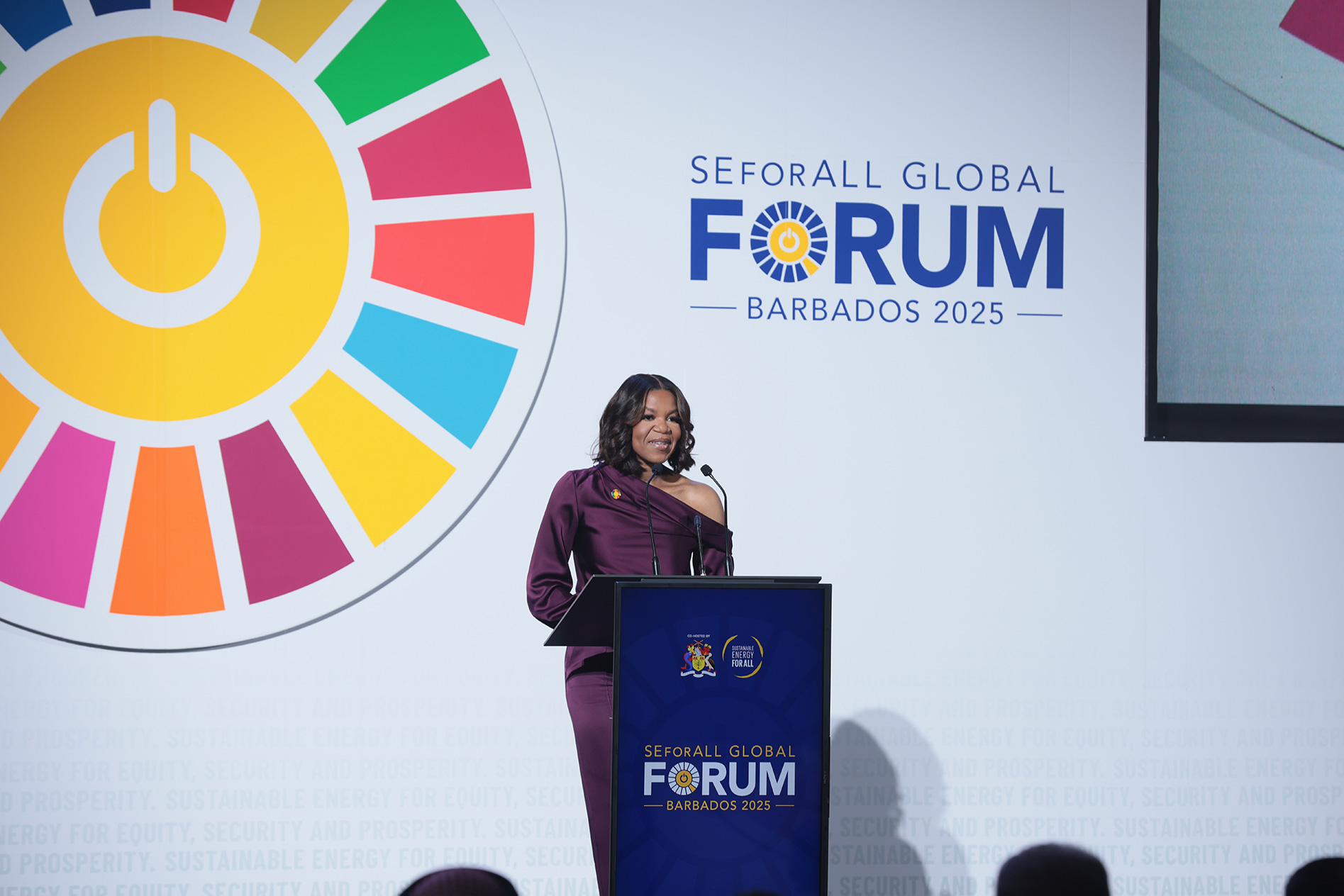By Valentina Guido, Charlin Bodley, Amber Zirnhelt
Additional contributors: Daniel Elkin, Laurie Stone
On the global stage, leaders are recognizing the critical importance of engaging girls and women in achieving affordable and clean energy access for all, goal 7 of the UN Sustainable development Goals. “SDG 7 cannot be achieved without engaging girls and women,” Botswana’s minister of Youth and Gender Lesego Chombo stated at the inaugural SADC Sustainable Energy Week in February in Gabarone. This sentiment was echoed at this month’s Sustainable Energy for All (SEforALL) Global Forum in Barbados by SEforAll CEO Damilola Ogunbiyi when she said, “We can’t just start with gender and youth inclusion, we must build gender and youth into everything we do, creating a supportive system of women leading the energy transition.”

Damilola Ogunbiyi, CEO and Special Representative of the UN Secretary-General for Sustainable Energy for All and Co-Chair of UN-Energy, at the SEforAll Forum in Barbados, March 2025
Energy access is not merely a cornerstone of a sustainable energy future, it is a catalyst for social progress and inclusive economic development. Yet, millions across the Global South, particularly in Africa, still live without access to electricity. This persistent energy gap disproportionately affects women and girls.
Inspiring progress is none the less happening across the energy landscape. Utilities and governments are driving the advancement of grid-connected clean energy projects, while off-grid energy solutions are accelerating and transforming the way communities access reliable and affordable power. This is why RMI is proud to be an implementing partner of the Africa Minigrids Program (AMP), a technical assistance program leveraging solar-plus-battery minigrids to enhance economic development and improve livelihoods across 21 African countries.
Despite the rapid growth of the clean energy sector, the disparity in energy access is mirrored in the underrepresentation of women in the energy transition, especially in technical and decision-making roles. Women remain underrepresented in the industry, facing barriers to entry, career progression, and leadership opportunities. While significant efforts have been made to encourage more women into STEM fields, there is an equally pressing need for vocational training and leadership development tailored to women’s unique needs and realities. Research shows that when women are in leadership roles they drive more equitable and sustainable outcomes, accelerating the energy transition at the scale and pace required to meet global climate goals. In addition to fostering a community of practice and offering technical training opportunities, the AMP seeks to support and highlight women champions in minigrid development across Africa.
Understanding the barriers to gender equality
RMI is committed to empowering women leaders in the clean energy sector globally, recognizing that their leadership is critical to the rapid advancement of clean energy and sustainable development goals. To address the need for supporting and growing women’s leadership in minigrid development in Africa, RMI conducted a needs assessment involving 100 women representing more than 95 organizations working in clean energy across three AMP-participating countries: Nigeria, Ethiopia, and Zambia. These women, engaged through survey and in-depth conversations, represent a wide cross section of the energy ecosystem including nonprofit and multilateral organizations; women’s organizations; electricity distribution, generation, and transmission companies; renewable energy project developers; government; and financial institutions. The assessment also provided critical perspectives from women’s organizations and development institutions advancing gender equality in the energy sector in the region.
We adapted a framework developed in 2023 by talent advisory firm Shortlist that lays out the core drivers of gender inequality. Focusing on capacity building, our research identified five key drivers of gender inequity:
- Opportunity pipeline, including lack of awareness and role models, educational disparities, and lack of access to training and project funding resources
- Hiring, including bias during outreach and interviews
- Workplace, including unattractive job features and unsupportive environments
- Social norms and perceptions
- Policy gaps
Click here to continue reading. This post was originally published on rmi.org.
